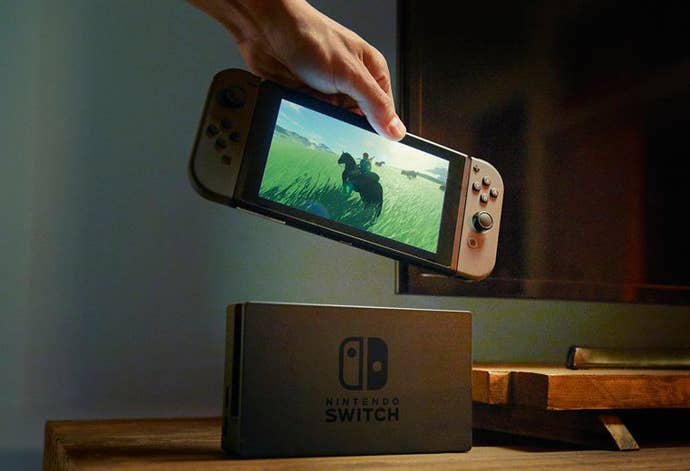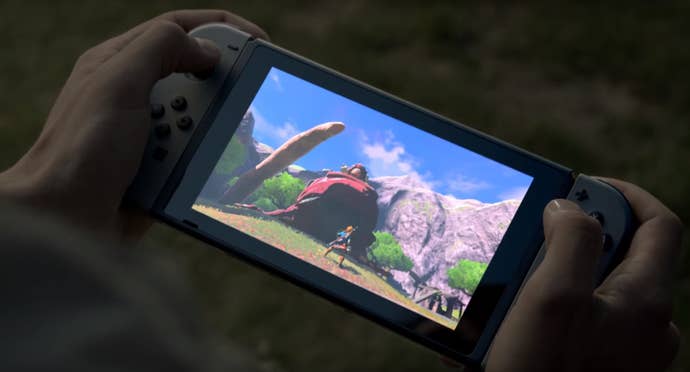Nintendo Switch's Hybrid Nature: Some of the Strengths, All of the Weaknesses?
The divide between portable and home is there because each side has different considerations. Can Nintendo bridge the gap?
This article first appeared on USgamer, a partner publication of VG247. Some content, such as this article, has been migrated to VG247 for posterity after USgamer's closure - but it has not been edited or further vetted by the VG247 team.
Next week, we'll finally get all the details on the Nintendo Switch, the console that is the future of the company. The veteran publisher has a new strategy for this console generation, putting all of its considerable effort and expertise into a single platform. You can think of the Switch as the successor to Nintendo's current home and portable consoles. It's a home console, taking over for the Wii U, but it's also a portable, taking over for the 3DS.

There are benefits to this concept. One of the bigger issues that Nintendo had prior to now was its divided focus: the company had to ensure a steady of flow of games for two very different platforms. It had to try a bring all of its biggest franchises to both platforms, while keeping those platforms flush with games on a regular basis. This change in operation was begun under the leadership of Satoru Iwata, with the former Nintendo president noting the shift in 2014 before the announcement of the Switch.
"We have integrated our hardware development divisions and established the 'Integrated Research & Development Division.' Until this change took place, we used to develop our handheld video game devices and home video game consoles in separate divisions. Of course, we did not simply merge two divisions into one. We know that we need to change how we manage this new division as well as how we create and manage new projects, and we are currently making progress on this," said Iwata at the time.

Nintendo itself has changed and the Switch is the vehicle of that change.
The Switch also allows Nintendo to bring the strength of the 3DS towards its home console efforts. Nintendo's portable offerings have always been stronger than their home counterparts. Even the smallest gap, between the Wii and the Nintendo DS, was still more than 50 million systems strong. The Switch lets Nintendo brings some of that heat home and allows for a tailored message. It's always a home console and a portable, but Nintendo can focus on the portable nature in a region like Japan, while focusing on the home console nature elsewhere.
I'm very excited for the Nintendo Switch. The problem is I think the nature of system shares the strengths of both home and portable consoles, but it also the weaknesses of each platform. Many enthusiast players are seeing the Switch as either a portable console that can be TV docked, or a home console you can take on the go. The issue here is one of consumer perception: moving beyond enthusiasts to the average consumer, because for the Switch to really succeed, Nintendo needs to reach those people.

The Switch As Portable
Taken as a portable console, the Switch stands tall as the successor to the 3DS and even the PlayStation Vita. You have a fairly large 720p touchscreen and significant mobile horsepower from Nvidia's custom Tegra chip. Since it lacks the horsepower of the PC, PlayStation 4, and Xbox One, mid-range developers have a chance to stand out, since HD asset creation (expensive!) is less of an issue. You can probably expect to see a good number of great Japanese and independent developers offering Switch versions of their games.
If you see the system as a portable though, you have two issues: price and smartphone gaming.
The general expectation with consumers is paying less for portable games. A copy of Pokemon Sun for 3DS will set you back $39.99. That's the norm for 3DS and Vita, and it's a norm that Nintendo itself has reinforced for years. With an average consumer that sees the Switch as a 3DS successor, there will be a bit of sticker shock, given that Nintendo will likely charge home console prices. Leaving out system price for the moment, if the average consumer sees the Switch as primarily a portable, $60 per game will cause a bit of sticker shock.
That $60 price tag doesn't help in a world where smartphone gaming is huge, meaning they're use to cheap or free gaming. A smartphone or tablet is a sunk cost for most families, factored in general life costs. They're already buying them to communicate over phone or social media, watch Netflix/Hulu/HBO GO/Crunchyroll, or general work purposes. That those platforms play games is ancillary, but since they're everywhere, the fact that they play games is helpful. Smartphone games aren't particularly deep, but they work on devices you always have around. That's 'good enough' for most consumers. The Switch doesn't get that same benefit: consumers will be thinking about the cost of the system and games.

The Switch As Home Console
If you change your perception of the Switch to primarily home console, you have a different set of problems that all interweave together: power, price, and library. System power is an ongoing issue with Nintendo and one they've only been able to overcome with the Wii. The Switch as a home console will be launching into a market with the PlayStation 4 and Xbox One.
Here, system price and library factor in: if Nintendo charges $300 for the Switch, then the system will have to sit on store shelves next to similarly-priced systems with greater visual prowess, more entertainment opportunities (both offer Blu-ray and various video services, the Switch will have to rely on the latter), and much larger game libraries. With 53 million PlayStation 4 systems out there, you have to convince a large contingent of consumers that they need this system in addition to what they already have.
How do you make that sale to the average consumer?
"Nintendo games" aren't enough of a selling point anymore or Nintendo wouldn't have to leave behind the Wii U. The thrust of the Switch is taking home console games with you. For that to work, consumers have to need such a feature. Those games have to be something consumers want and they need a reason to 'Switch' the console to portable. That works if you're going to the bathroom, or if perhaps you have a work commute. But selling the system as both all the time doesn't really work, because it has to consider both play types.

The Switch preview video has a number of general uses: Home play, portable play, and portable multiplayer in various configurations. The latter is potentially useful, but it requires developers to make sure their game controls fit within a single JoyCon, which misses two buttons of the full Switch experience, has a reversed analog stick/button combo on one side, and frankly, looks small as hell for certain sized hands.
It's very cool, but I'm not seeing every developer covering the idea. The difference between "the system can do this" and "developers will utilize this" is wide. As an example, the PlayStation 4 Pro does allow developers to use that power for 60 fps gaming, but the number of developers that do so is small.
I bring this up because how the system is perceived is important. Take a nuclear family as an example for the different market Nintendo is trying to encompass. With portables or mobile devices in a large family, each family member has their own device. With the home console, the system is a shared commodity. The Switch works there better as a home console, with a single screen and split JoyCons potentially allowing multiplayer right out of the box. A Switch at $300 for each family member becomes prohibitively expensive.
I want the Switch to succeed because I like the concept of the system, but for that to happen to has to reach beyond people like me. The Switch wants to be all things to all people, but it really can't be. Reaching each side of the portable and home divides requires different considerations. In some lifestyles, the Switch is a better portable device, while in others it's primarily a home device, but it carries the problems of the other market regardless of your preferred use. Nintendo can overcome this, but it requires smart marketing, smart messaging, and smart pricing. Hopefully next week we'll see if they can deliver.









